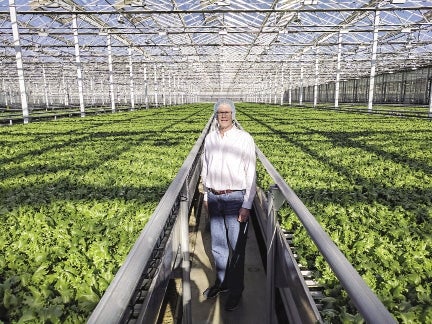The farm of the future is in a nondescript greenhouse down a wooded residential road next to a site where the military once trained for the Vietnam War.
This is where lettuce and arugula is grown without the touch of a single hand, and without a drop of irrigation that isn’t rainwater. The produce is grown not in soil but in a mineral mixture laid along a narrow plastic tray.
Little Leaf Farms in Devens has, in just over a year, drastically changed the ability of shoppers in New England to buy fresh, local leafy greens year-round, something never possible with traditional farming.
Little that Little Leaf Farms does is traditional.
Across a three-acre greenhouse, tens of thousands of heads of leafy greens pass through a completely automated system in just 25 days. Each of 30,000 trays are filled by machine with a mineral product by the Dutch company Rockwool, acting as a type of soil.
“It’s better than soil,” said Paul Sellew, the Little Leaf CEO and co-founder.
Seeds are planted by machine, and trays are rolled along a conveyor belt to find their way into a shady spot in the greenhouse for three days. Tiny “fertigation” tubes — that is, they carry fertilizer and irrigation — run below each tray, with gravity carrying the nutrients along the trays’ 19-foot length.
Little Leaf Farms in Devens grows leafy greens in 30,000 thin trays with 90% less water and with no human touch. @LittleLeafFarms pic.twitter.com/5RH7BMR6eX
— Grant Welker (@GrantSWelker) October 30, 2017
Over the next few weeks, the greens slowly move along another conveyor as they grow until they’re ready to be chopped and packaged, moving along a series of conveyor belts like a Rube Goldberg machine. The first hands to touch the product pack it to be shipped within minutes of it first rolling out of the greenhouse.
The greens arrive the next day at 800 grocery stores across New England and upstate New York, including Stop & Shop, Shaw’s, Star Market, Hannaford and Market Basket.
It isn’t just rare to get lettuce from Massachusetts — it’s nearly unheard of. More than 98 percent of all lettuce consumed in the United States comes from California or Arizona, according to the U.S. Department of Agriculture.
Little Leaf Farms may look like a common sense investment in efficient farming, but there was no guarantee in it working, said Tim Cunniff, executive vice president of sales and marketing.
“There’s no surety that you can sell your product,” Cunniff said.
The Rube Goldberg-like packaging process at Little Leaf Farms in Devens. The greenhouse gets lettuce and arugula out year-round. #MAbiz pic.twitter.com/KbkX8o3IPc
— Grant Welker (@GrantSWelker) October 30, 2017
Little Leaf Farm, however, has sold so much that an expansion to double its size will come online next spring. The farm’s first harvest was in July 2016.
The operation does it all with far less water and labor — it has 20 employees — than any traditional farm of its size would have. In fact, it uses 90 percent less water than a typical farm, and only rain water, thanks to a 15-foot-deep, two-million-gallon water basin just outside the greenhouse collecting rain off the facility’s roof.
The greenhouse primarily uses sunlight, but during the low-light winter months, it complements natural sunlight with efficient LED lights. The operation grows just as efficiently in December as it does in June, in an area where the outdoor growing season for lettuce is 10 to 12 weeks.

